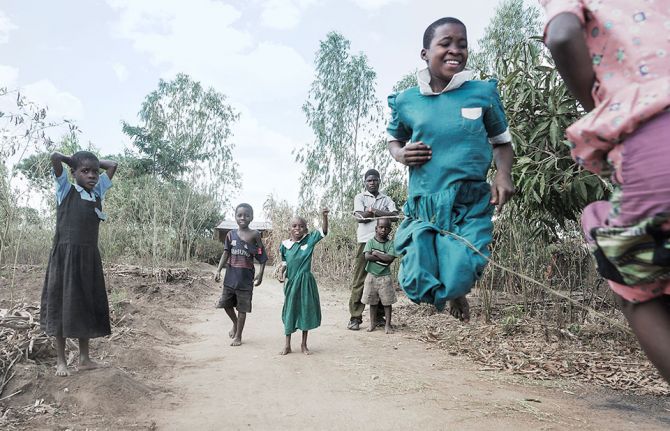

Press Statement
UNAIDS calls for bold action to end TB and AIDS
23 March 2018 23 March 2018GENEVA, 23 March 2018—Ahead of World TB Day 2018, UNAIDS is calling on all partners to take unprecedented and bold action to advance efforts to end tuberculosis (TB) and AIDS by 2030.
TB continues to be the top infectious killer worldwide, claiming more than 4500 lives a day. TB is also the leading cause of death among people living with HIV, causing one in three AIDS-related deaths. In 2016, 1.7 million people died from TB, including around 374 000 people living with HIV.
“The world has the resources to end the interlinked epidemics of tuberculosis and HIV, but political commitment and country action are lacking,” said Michel Sidibé, UNAIDS Executive Director. “Political, religious and civil society leaders need to step up to guarantee everyone the right to breathe, to live free from tuberculosis and AIDS.”
TB is preventable and curable; however, persistent challenges remain. Many of these challenges are also faced by the HIV response and can be effectively addressed if programmes are integrated. They include unequal access to services, with the most marginalized people still out of reach, the need to access education, housing and basic services to prevent, diagnose and treat TB and HIV through local health-care services and community health-care workers, the need to strengthen health systems and the urgent need to mobilize resources in programming, research and development.
To address the challenges and push forward the response to TB and HIV, UNAIDS has outlined five important actions for partners:
- Give a new impetus to the response to TB and HIV by impelling political, religious and civil society leaders to champion the universal right to live free from TB and HIV, building on existing rights and health and social movements.
- Empower communities to demand their right to health. Affected communities must call on governments to improve living standards, including by accessing nutritious food, breathing clean air, completing their education and fostering an enabling economic environment, all of which will help to reduce the burden of TB and HIV.
- Ensure rights-promoting and non-discriminatory service delivery for all, especially for people at higher risk of TB and HIV, such as children and marginalized populations, to protect them against catastrophic health expenditures in the context of universal health coverage. Thus, duty of care extends beyond health to include safe workplaces and places of detention.
- Engage ministers of finance to approach health as an investment, not an expenditure. While the above actions carry some financial outlays, assessments of returns on investment in health have demonstrated their long-term value to societies and economies. An efficient and effective response to HIV and TB will require working across all ministries and sectors to mobilize sufficient domestic financing to strengthen health systems.
- Innovate for new medicines and vaccines. Greater partnerships between the public and private sectors are urgently needed to accelerate innovation that leads to the discovery, development and rapid uptake of new tools to prevent and treat TB and HIV, as are strategies for shorter and less-toxic TB regimens.
Ending the global TB and HIV epidemics is possible. HIV is preventable and effective and affordable treatment is available. TB is preventable, treatable and in most cases curable.
Progress has been made—deaths from TB among people living with HIV declined by 37% between 2005 and 2016 as prevention, testing and treatment have improved and increased. However, there is still much more work to be done.
In September 2018, world leaders will come together at the United Nations in New York, United States of America, for the first-ever United Nations General Assembly High-Level Meeting on Tuberculosis. This meeting will be an important opportunity for countries to adopt a progressive, visionary and actionable political declaration on TB.
“The United Nations High-Level Meeting on Tuberculosis could provide the political, social and financial momentum needed to end TB,” said Mr Sidibé. “This year could be the most important since Robert Koch discovered the cause of TB136 years ago, but only if we all show leadership.”
UNAIDS urges all partners to ensure that TB is elevated on global, regional, national and subnational political and social agendas, that TB and HIV are addressed in unison and that partners combine robust efforts to end TB and HIV by 2030 as part of the Sustainable Development Goals.
UNAIDS
The Joint United Nations Programme on HIV/AIDS (UNAIDS) leads and inspires the world to achieve its shared vision of zero new HIV infections, zero discrimination and zero AIDS-related deaths. UNAIDS unites the efforts of 11 UN organizations—UNHCR, UNICEF, WFP, UNDP, UNFPA, UNODC, UN Women, ILO, UNESCO, WHO and the World Bank—and works closely with global and national partners towards ending the AIDS epidemic by 2030 as part of the Sustainable Development Goals. Learn more at unaids.org and connect with us on Facebook, Twitter, Instagram and YouTube.
Publication
Infographics
What UNAIDS does on...
Multimedia
Press centre
Download the printable version (PDF)
